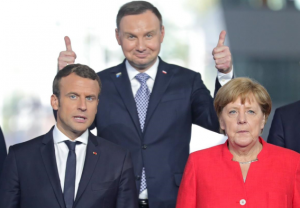Further divisions with the European Union (EU) have opened up after Poland hit out over Emmanuel Macron’s protectionist plans for the bloc.
The recently elected French president has called for an array of Europe-first policies such as his proposal for a “Buy European Act” as part of his so-called “Macronomics” plan which would restrict public procurement in the EU to companies that have at least half of their production in Europe.
Emmanuel Macron said in May: “Globalisation is a tough fight because not everyone always respects the rules… So we will turn the protection of European industry into one of the major pillars of reinventing the EU.”
Poland’s deputy foreign minister in charge of European affairs Konrad Szymanski, speaking in Berlin, said: “The future development of the European Union‘s single market is causing the biggest concerns for us.”
He added: “We do not want to pay for the Macron victory,” in reference to a debate in EU countries that governments should fight back against rising populism by making concessions on the openness of markets.
German Chancellor Angela Merkel said last month she was open to Mr Macron’s proposal to create a level playing field between EU countries and other international trade partners.
Mr Szymanski pointed out that the completion of the internal market for services and for the digital economy was still a work in progress that had to be finished urgently.
Poland has objected to a number of EU-led directives, particularly over its perceived dominance of the bloc by the likes of France and Germany which it sees as disadvantaging smaller members, such as itself.
It has objected to the imposition of an EU-wide migrant quota being imposed.
In November 2015 after the Paris terrorist attack which killed at least 127 people, Mr Szymanski said his government did not agree with Poland’s commitment to accept its share of an EU-wide relocation of migrants.
Mr Szymanski added: “In the face of the tragic acts in Paris, we do not see the political possibilities to implement [this].”
Even in May this year he said that plans to disperse 160,000 migrants around Europe was “not implementable”.
Ask me anything
Explore related questions





